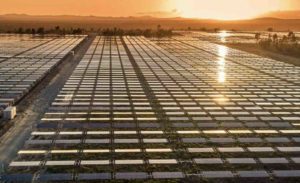Leading renewable energy and battery storage developer Neoen says it is likely to take a financial hit from the lengthy delays to the big Bulgana wind and battery storage project in Victoria because the damages claims it can make for lost income are capped and will be exhausted soon.
The 212MW Bulgana wind farm, which will also feature a 20MW/34MWh Tesla big battery, is one of a number of large scale wind and solar projects facing major delays, largely because of grid congestion issues in Victoria, and due to increasingly complex connection requirements.
Neoen, which also operates the Tesla big battery at the Hornsdale Power Reserve in South Australia, and a number of other wind and solar projects in the country, says its contract with Siemens-Gamesa is covering loss of revenue from the Bulgana delays now, but it will soon reach a “cap” on the extent of so-called “liquidated damages.”
“We are late,” Neoen CEO Xavier Barbaro said in comments to analysts after the company’s annual results were released overnight. “Grid connection is complex in Australia.”
Barbaro said Bulgana was hoping to deliver its first power into the grid before the end of June, but would not likely reach full production until near the end of calendar 2020. He said the deal with turnkey contractor Siemens Gamesa (for both the wind farm and the battery component) was robust, but would shortly reach a cap.
“We have been well compensated for those delays,” Barbaro said. But the contract would soon reach its limit and “the near future will be more harmful than the past.”
Liquidated damages have been a common feature of the Australian renewable energy landscape, due to the common and sometimes lengthy delays in commissioning and connections. It has been cited by some contractors as the main cause for quitting the market, and has led to stand-offs between developers and contractors in some instances.
Neoen is also expecting delays across the board due to the Covid-19 pandemic, which it says will affect supply chains, financing, and make project construction more complex.
That means that rather than boosting its installed global capacity of wind, solar and storage from 2GW to 5GW by the end of 2021, when some of those new projects are likely to be still in construction, it was now aiming for the end of 2022.
Those projects include Bulgana and the expansion of the Hornsdale Power Reserve, aka the Tesla big battery, in South Australia where it is adding 50MW/64MWh to what is already the world’s biggest lithium-ion battery. There appears to be no significant delay to that project.
See separate story: Tesla big battery lifts profits by one third in 2019, expansion on track
Barbaro also announced that Neoen had signed a power purchase agreement with a major utility for 352MW (DC) of solar. He did not identify the location, but given it is a utility, rather than a corporate buyer, there is a fair chance it might be one of its Australian projects. Neoen declined to comment further other to say it will all be revealed in April.
“Because of Covid-19 there will be some delays … there will be a higher proportion under construction and not yet in operation compared to what we anticipated some weeks ago,” Barbaro said.
The impacts would be felt in the supply chain, financing (as banks reassessed the state of debt markets), and also in personnel, who would be unable to travel to complete and conduct commissioning for key projects.
“It’s not just about the parts …. quite often some experts are coming from Europe to commission assets in Australia or South America,” he said. “Of course, they cannot travel right now.
“There are no strong worries about (production) of solar modules or inverters or transformers or solar trackers. In the end a project is as strong as its weakest link. It’s not just the parts, experts are coming from all over the world, it’s happening already.
Barbaro also noted there was a “little game” being played where “force majeure” was being cited by suppliers and others, blaming Covid-19. But it was clear that not all were legitimate. “It is true for everyone, not only in the energy sectors, but for most sectors in the economy. It does not mean it is always legitimate. We need to sort it out.
“Some of our projects are already slowing down. That is something we fully understand. That can be due to supply, personnel, and local regulation. it going to happen pretty much everywhere and for quite some time.”
RenewEconomy and its sister sites One Step Off The Grid and The Driven will continue to publish throughout the Covid-19 crisis, posting good news about technology and project development, and holding government, regulators and business to account. But as the conference market evaporates, and some advertisers pull in their budgets, readers can help by making a voluntary donation here to help ensure we can continue to offer the service free of charge and to as wide an audience as possible. Thankyou for your support.








